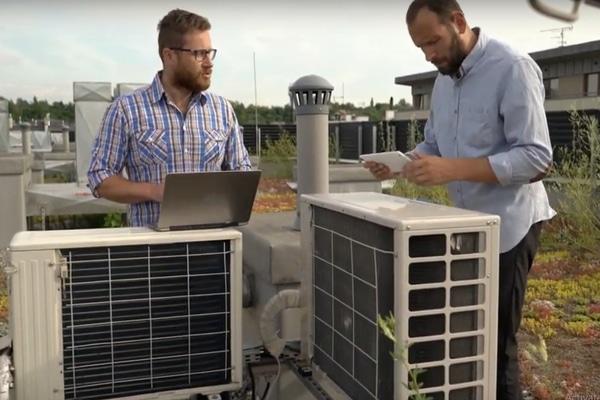Do you want to become a highly-skilled HVAC (Heating, Ventilation, and Air Conditioning) technician? HVAC technicians are in high demand, making it an increasingly popular career choice not only across the United States, but around the world.
In fact, according to the United States Bureau of Labor Statistics, the growth rate for HVAC technicians is more than the average for any other profession!
Heating, Ventilation, and Air Conditioning (HVAC) systems are necessities in residential and commercial projects. While the people using them take these systems for granted, it’s critical to understand just how complex they really are.
When it comes to installation and maintenance, or when the HVAC system suffers a breakdown of any sort, an HVAC technician is the first person they call.
Table of Contents
How Much Time Does It Take to Become an HVAC Technician?
-
Apply for an HVAC degree at NEIT!
Loading…
/**/
The easiest way to kick-start your career as an HVAC or HVACR (Heating, Ventilation, and Air Conditioning, Refrigeration) technician is to receive a recognized associate degree.
While some associate’s degrees at HVAC schools take two-to-three years, you can complete the HVAC program in as little as 18 months at the New England Institute of Technology.
START YOUR HVAC CAREER
Earn your degree in HVAC from NEIT and begin your new career path today!
ASSOCIATE'S DEGREE
Three Routes for Becoming an HVAC Technician:

This growth rate is just as fast as any other occupation. Rapidly evolving infrastructures, commercial and residential building construction will keep creating job opportunities for HVAC experts.
Apart from getting a degree in the field from a community college, you can also explore the following approaches to become an HVAC professional.
On-the-Job Training
On-the-Job training is an old-school way of doing things. If you have a high-school diploma, you can start your journey in the HVAC industry by assisting an HVAC technician, journeyman, or master.
Generally, this turns out to be the longest route to becoming a skilled HVAC technician, but it is still an option. Working under experienced HVAC technicians can enable you to understand how things work in the industry and pick up practical skills on the job.
Get a Degree or Certification
You can choose to earn an HVAC certification or sign up for a program in refrigeration, air conditioning, and heating technology from a trade school or vocational school. Such training programs usually take anywhere between 6 months and three years to complete.
START YOUR HVAC CAREER
Earn your degree in HVAC from NEIT and begin your new career path today!
ASSOCIATE'S DEGREE
Courses under such training programs include key subjects like heating technology, refrigeration mechanics, air conditioning, air quality, climate control systems, electrical controls, low-pressure systems, high-pressure systems, modern heating systems, blueprint reading, pipe fitting, duct layout, marine welding, and cutting, and technical math.
Participate in an Apprenticeship Program
Apprenticeship programs are also a great way to gain a solid foundation in the HVAC industry.
How to Get an HVAC Apprenticeship
To work as an HVAC tech apprentice, you will need to find journeymen around you and visit them with your official documents for an interview. Explain your reasons for wanting to work as an apprentice (rather than getting a degree or certification).
You might need to start as an unpaid intern and prove your worth during the trial period before you start earning regularly.
Alternatively, you can also contact a union and submit an application to them. In most cases, you will need to have a valid high-school diploma and a driver’s license. You might also need to take a math exam and a drug test.
Some states in the US offer employment assistance, too. Contact your state’s HVAC licensing board or employment assistance representative to get more information.
While the routes mentioned above are all good, enrolling in a reputed institute’s degree program is the best way to go about it. Colleges like NEIT offer internships and work opportunities as a part of their program, apart from providing extensive classroom and lab training.
Benefits of HVAC Tech Apprenticeships

The top advantages of undertaking apprenticeship programs in the HVAC industry include learning to apply essential concepts like:
- Construction, industrial, and maintenance blueprints
- Using HVAC systems, tools, and equipment
- Installing air conditioning and refrigeration components
- Basic ventilation requirements across a range of projects
- Air distribution and cleaning systems
- Servicing refrigeration systems and air conditioning control systems
- Advanced circuitry and new technology
- Piping materials for various applications
How Long is an Apprenticeship?
The rules around an HVAC apprenticeship’s duration to obtain certification or licensure differ region to region. In some cases, you need to clock a set number of hours on the job before becoming eligible for a certification exam.
Other states involve you to have a three-to five-year-long commitment as an apprentice. Depending on which state you live in, the requirements may vary. In any case, if you can work long hours, you can complete the “hour” requirements in quick time.
Obtaining an HVAC License
While an HVAC license or HVAC certification license isn’t mandatory in all states, it is a fantastic asset to have. A license can help you fortify your skill set and serve as one of your USPs when seeking employment.
New York, Indiana, Illinois, Kansas, Vermont, Colorado, and Wyoming are some states that do not require you to have a license. However, almost all the other regions in the United States will need you to be a certified HVAC technician to ply your trade. In such cases, you must clear a written exam.
The licensing requirements, exams, and mandates may vary from state to state. Read this state-wise guide to understand licensing laws.
There are a few ways in which you can obtain an HVAC license:
HVAC Training Program
Get a formal education in HVACR technology – this is perhaps the most reliable and comprehensive way to ensure that you have the right training and a solid understanding of what you need to do on the job.
Make sure you sign up for an accredited HVAC training program at a good college.
HVAC Apprenticeship
Get in touch with local associations such as the Air Conditioning Contractors of America or the Associated Builders and Contractors to explore HVAC apprenticeship opportunities.
Practical Experience
Get on-the-job training by working under an HVAC journeyman or contractor since most certifications will need you to have a bare minimum of 12 months of field experience.
Additional Certifications
Contact agencies like the North American Technical Excellence (NATE), HVAC Excellence, Refrigeration Service Engineers Society (RSES), and Refrigeration Engineers and Technicians Association (RETA) to understand what kind of additional specialty certifications they offer.
Ready to launch your HVAC career as a technician?
START YOUR HVAC CAREER
Earn your degree in HVAC from NEIT and begin your new career path today!
ASSOCIATE'S DEGREE
FAQs
Do HVAC technicians make good money?
How would you define good money? If it means getting a fair opportunity to earn $48,730 per year, then yes, HVAC professionals with the right skills and training make good money. By the way, that is the median annual wage for HVAC technicians, mechanics, and installers in the United States.
How much do HVAC techs make per hour?
According to the United States Bureau of Labor Statistics (BLS), HVAC technicians, mechanics, and installers make $23.43 per hour (average median income). With work experience, you will be able to command a better wage for your work.
Is becoming an HVAC tech worth it?
Yes, HVAC technicians are in massive demand across the United States, thanks to the flourishing construction sites, infrastructure, and technological progress. It is a consistently growing field, and the job outlook is promising, so getting an education in the subject is a rewarding prospect.
How long do you have to go to school for HVAC certification?
Degrees could take anywhere between two to five years to complete. However, you can complete certain HVAC programs, like New England Tech’s offering in refrigeration, air conditioning, and heating technology, in as little as 18 months.

